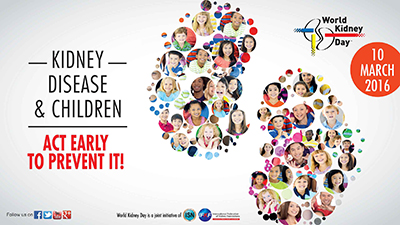 Kidney disease can happen even in children. Like adults, kidney disease in children often remained undetected until the child shows sign and symptoms of kidney problem.
Kidney disease can happen even in children. Like adults, kidney disease in children often remained undetected until the child shows sign and symptoms of kidney problem.
One of the causes of kidney problems in children can be due to underlying abnormality in the urinary tract causing blockage or poor flow. In these kids, urine can flow back into the kidney due to a condition called ‘reflux’. When this happens, they can have recurrent episodes of urinary tract infection which can cause damage to the kidney.
There are also cases of children who are born with single kidney (renal agenesis) or one of their kidneys does not function well (renal dysplasia). Others may get inherited kidney disease like polycystic kidneys (a condition where their kidneys have multiple fluid-filled cysts which may pop and damage their kidney tissues). They may have increased risk for developing kidney disease but generally would remain healthy without symptoms.
Some children can have a condition called nephrotic syndrome. Nephrotic syndrome occurs when the kidney is not able filter proteins properly causing proteins to leak out into the urine. This can cause protein level inside the body to be low. When this happen, the whole body can swell up.
Children who have been diagnosed with diabetes or autoimmune disorders such as systemic lupus erythematosus (SLE) at very young age are also vulnerable to have kidney failure or nephrotic syndrome especially if their diabetes control is poor. It is very important for young diabetics to control their sugar level in order to avoid this complication.
Do consult your pediatrician if your child has any of these symptoms
- Generalized swelling of the hands and feet
- puffiness around the eyes and face
- Lack of or decrease in appetite.
- Decreased or increased frequency of urination
- Changes in urine color – it can become very dark or red, which can indicate blood
- Changes in appearance of urine like having lots of foam which may indicate protein leaking in the urine
- Headache due to high blood pressure
- Stunted or poor growth as compared to similar age group peers
- Difficulty concentrating and poor school performance
- For families with known hereditary kidney diseases – it is important to have early screening. Those who have family history of hereditary kidney disease have higher risk to develop similar problem at early age
We can prevent children from progressing to advance chronic kidney disease by detecting kidney problems early and treating early.
Dr. Nurhidayati is a permanent columnist for The Malaysian Medical Gazette and an internal medicine physician. This article was written in conjunction with World Kidney Day 2016.
